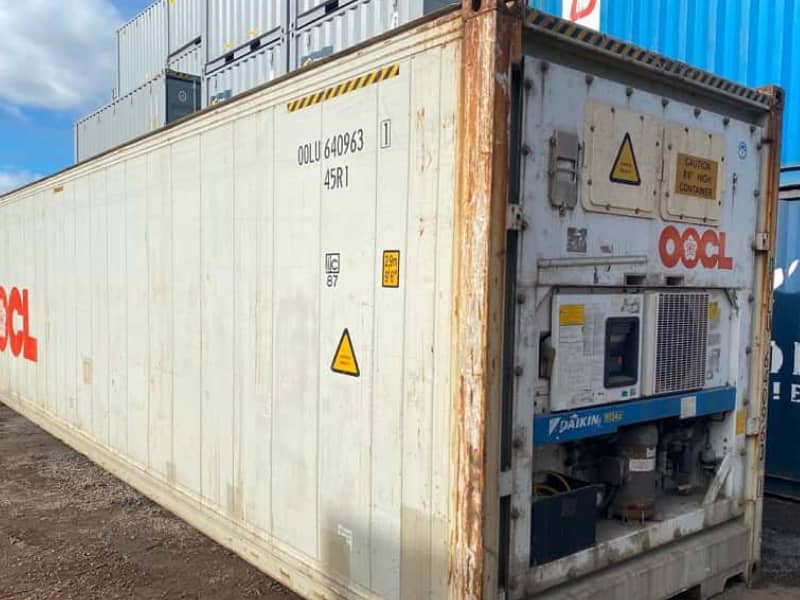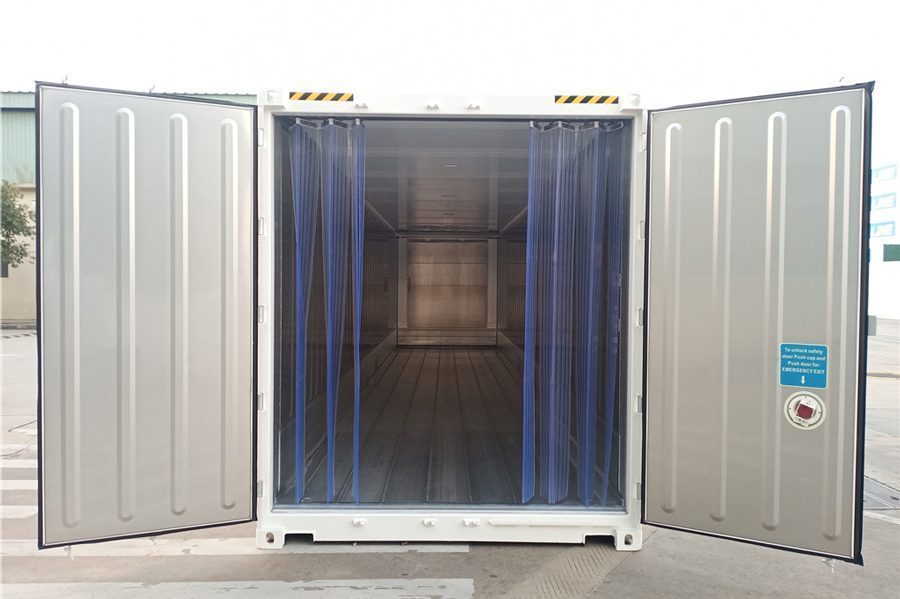Learn why used 40ft refrigerated shipping containers are perfect for cold storage
Everything About Freezer Containers: Important Insights for Your Storage Requirements
Cold store containers play an essential function in the preservation of subject to spoiling items. They are available in various forms, consisting of chilled and insulated units, each created for details storage demands. Recognizing the benefits and crucial functions of these containers is vital for companies aiming to enhance their procedures. As the demand for effective storage options expands, discovering the various choices available can bring about notified choices that influence both productivity and sustainability. What variables should one think about when selecting the ideal container?
Types of Freezer Containers
Cold storage containers been available in various kinds, each made to meet particular temperature level control demands. Among the most common types are chilled containers, which preserve temperature levels in between 0 ° C to 10 ° C, making them ideal for subject to spoiling goods like fruits, veggies, and dairy items. Another kind is the deep fridge freezer container, which operates at temperature levels below -18 ° C, suitable for long-term storage of icy items such as meats and fish and shellfish.
Insulated containers supply temperature stability without active air conditioning, making them helpful for temporary transport of temperature-sensitive items. Furthermore, there are mobile freezer units, which provide versatility in locations and are often utilized in events or seasonal procedures. Lastly, blast chillers quickly reduce the temperature of warm foods, making sure security and high quality. Each kind serves an one-of-a-kind purpose in different industries, from food solution to drugs, emphasizing the value of selecting the best container for specific storage space requirements.

Advantages of Making Use Of Cold Storage Space Solutions

Cold storage space remedies extend the rack life of items, reducing waste and boosting earnings for companies. By successfully handling stock with correct temperature level control, firms can maximize their supply chains and boost operational performance.
Additionally, freezer facilities permit versatile storage space options, accommodating various volume needs and seasonal variations popular (used 40ft refrigerated shipping containers). This flexibility aids companies react quickly to market changes
Finally, utilizing cold store solutions can assure compliance with health and wellness guidelines, protecting both consumers and organizations. In general, the critical use cool storage space boosts item monitoring while promoting sustainability and economic viability.
Key Attributes to Look for in Cold Storage Containers
When selecting freezer containers, a number of essential attributes value careful factor to consider to secure peak performance and dependability. Temperature control capabilities are crucial; containers ought to keep consistent temperature levels suitable for certain goods. Insulation top quality also plays a substantial role, as premium insulation lowers energy usage and improves temperature level security.
Next off, ease of access and loading is important; containers should use user-friendly designs for effective handling and organization. Durability is one more vital aspect; weather-resistant materials guarantee durability and secure materials versus environmental elements.
In addition, wheelchair attributes, such as integrated wheels or raising points, facilitate transportation, while customizable layouts permit customized storage remedies.
Last but not least, checking systems, including temperature alarms and remote monitoring, supply real-time updates, making sure that conditions stay optimal. By focusing on these features, individuals can choose freezer containers that satisfy their functional needs efficiently.
Picking the Right Freezer Container for Your Needs
Selecting the right cold store container needs a thoughtful assessment of particular demands and functional requirements. Variables such as the sort of products being saved, temperature level sensitivity, and volume ought to be prioritized. Perishable food things might necessitate containers with rigorous temperature controls, while pharmaceuticals might call for precise conditions to maintain efficacy.
In addition, potential customers ought to take into consideration the container's dimension and flexibility. A bigger system may be needed for bulk storage space, while smaller, mobile choices might be perfect for momentary or on-site demands. Insulation top quality and energy performance are likewise crucial, as these will impact functional prices and temperature security.
Compliance with market laws and standards is important, especially in markets like food and health care. By meticulously evaluating these facets, users can pick a freezer container that effectively satisfies their special demands and assurances optimum storage problems.
Ideal Practices for Maintaining Freezer Conditions
Keeping ideal cold store conditions is essential for preserving the quality and security of temperature-sensitive items. Consistently keeping track of temperature and humidity degrees is vital; using reputable digital thermometers and hygrometers can supply precise readings. Proper insulation of cold storage containers helps reduce temperature level fluctuations and power loss.
Carrying out a first-in, first-out (FIFO) system ensures that older inventory is used before newer stock, reducing waste (used 40ft refrigerated shipping containers). In addition, maintaining an arranged format within the storage room permits for much better air movement and lessens the risk of cross-contamination
Routine upkeep checks on devices, such as seals and compressors, are necessary to stop breakdowns. Team training on best techniques for packing and dumping products helps preserve temperature level stability. Maintaining doors shut as much as feasible limits heat exchange, assuring that the chilly storage space environment stays secure and effective in protecting important items.
Price Factors To Consider for Cold Storage Space Solutions
When examining cold storage services, it is vital to think about the initial investment costs alongside recurring operational expenditures. An extensive malfunction of these costs can expose considerable lasting savings potential for organizations. Understanding these financial facets helps stakeholders make informed choices concerning their freezer needs.

Initial Financial Investment Expenses
The monetary landscape of cold store containers provides various preliminary investment costs that organizations have to take into consideration. These costs commonly include the purchase or rental price of the containers, which can differ based upon size, kind, and insulation quality. In addition, costs associated with retrofitting existing frameworks to fit freezer should be factored in, especially if specialized devices is needed. Installment prices, including electrical job and refrigeration systems, likewise add to the general initial investment. Services ought to not forget transportation costs for supplying containers to their preferred location. Ultimately, prospective modification options, such as shelving or temperature tracking systems, can better influence the first economic outlay. Mindful budgeting for these elements is essential for effective cool storage execution.
Operational Costs Breakdown
Functional expenditures for chilly storage solutions incorporate a number of critical cost factors to consider that organizations must navigate. Trick factors include energy prices, which can be significant because of the requirement to keep low temperatures. Upkeep expenditures are likewise considerable, as routine servicing is necessary to assure equipment runs effectively and remains certified with health and wellness and security requirements. Additionally, labor expenses may emerge from the need for specialized staff to check the storage and take care of setting. Insurance expenditures are one more factor to consider, as firms need to safeguard their investments versus possible losses. Any kind of potential governing conformity expenses need to be factored in, as organizations might need to spend in systems that adhere to food security and ecological laws. Recognizing these expenses is crucial for reliable budgeting.
Long-Term Cost Savings Possible
Investing in freezer remedies offers considerable long-term financial savings capacity, transforming first expenses into monetary effectiveness gradually. By lessening wasting and waste, businesses can enhance their profit margins significantly. Advanced insulation and energy-efficient systems reduce utility prices, which collect over the life expectancy of the equipment. Cold storage space containers commonly need much less constant maintenance contrasted to standard refrigeration methods, leading to lower fixing expenses. The capacity to shop products for extensive durations without compromising top quality allows services to exploit on market changes, optimizing earnings. Additionally, the scalability of used 40ft cold storage containers cool storage services allows firms to adjust to transforming needs without incurring excessive expenses. Overall, these variables add to a compelling case for freezer as an economical investment strategy.
Often Asked Questions
For How Long Can Food Be Stored in Cold Storage Containers?
The duration food can be stored in cold store containers varies by kind. Generally, perishable products last from days to weeks, while icy foods can stay secure for months, relying on appropriate temperature and storage problems.
Are Cold Storage Containers Energy-saving?
The power effectiveness of freezer containers varies based on style and insulation top quality. Modern devices frequently utilize sophisticated innovation to minimize energy consumption, ultimately adding to decreased functional costs and environmental influence in lasting use.
Can Cold Storage Containers Be Customized for Details Demands?
Freezer containers can undoubtedly be personalized to fulfill particular requirements. Modifications may consist of temperature level controls, dimension changes, and added features, permitting individuals to tailor solutions efficiently for numerous storage space demands and operational choices.
What Are the Usual Dimensions of Freezer Containers?
Freezer containers typically come in typical dimensions such as 10, 20, and 40 feet. These dimensions suit numerous storage needs, making sure versatility for services requiring temperature-controlled environments for delicate materials or disposable items.
Do Cold Storage Space Containers Require Special Permits for Use?
Freezer containers usually need unique authorizations for use, relying on regional guidelines and planned applications. Authorities might mandate licenses to guarantee safety and security criteria, ecological conformity, and proper functional techniques are kept during their use.
Cold storage containers come in numerous types, each made to meet particular temperature level control requirements. Additionally, cold storage space facilities allow for adaptable storage alternatives, accommodating various volume needs and seasonal fluctuations in demand. Choosing the appropriate chilly storage space container requires a thoughtful analysis of functional requirements and particular needs. The monetary landscape of cold storage containers offers numerous initial investment expenses that services have to consider. Cold storage space containers can undoubtedly be customized to fulfill particular demands.